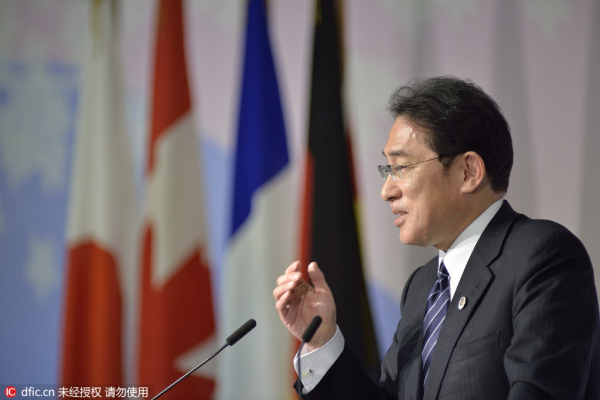Missed opportunity to seek solutions to common challenges
Updated: 2016-05-23 08:02
By Cai Hong(China Daily)
|
|||||||||
 |
|
Japanese Foreign Minister Fumio Kishida gestures during a press conference at the International Media Center in Hiroshima, Japan on April 11, 2016 after Foreign Ministers meeting of G7 countries visit the Peace Memorial Museum. [Photo/IC] |
On Friday, Japan's Foreign Ministry released the agenda of the G7 summit meeting, which the island country will host this week.
Social and economic issues aside, Japan has decided to put "maritime security" on the agenda, saying it will highlight the "importance of rule of law and the peaceful resolution of disputes".
Japan will also hold two outreach sessions-one for Asia and the other for Africa-on the sidelines of the G7 meeting. As it is the first summit to be held in Asia in eight years, Japan has taken it as an opportunity to talk about the region's path towards prosperity. So it has invited the leaders of Bangladesh, Indonesia, Laos, Papua New Guinea, Sri Lanka and Vietnam to discuss "quality infrastructure investment" and "open and stable seas".
When two Japanese officials gave a briefing on the summit on Friday, a Tokyo-based German journalist said Asia's prosperity is not possible without China and the Republic of Korea, two major players in East Asia.
"You haven't invited China and South Korea to the summit. Does that make sense?" he asked.
The two officials were obviously surprised by this question because they could hardly find words to answer.
It is fair to say that even though Japan, the only Asian nation in the G7 group, wants to put regional issues on the summit's agenda, the exclusion of China and the Republic of Korea makes such discussions essentially meaningless.
With many tough, complicated issues challenging the region, this is a missed opportunity to foster a sense of cooperation in the face of common challenges.
The World Bank has trimmed its 2016 and 2017 economic growth forecasts for East Asia. While developing nations in East Asia-from Indonesia to China-have benefited from careful economic policies, global risks are considerable and threaten the region's outlook. Among these are a slowdown in high-income countries, the slump in exports and financial market volatility.
At the same time, the situation on the Korean Peninsula is brittle and could break at any moment, provoking a crisis of global dimensions.
China, Japan and the ROK are members of the Six-Party Talks, a framework to resolve the DPRK nuclear issue through dialogue. China's Special Representative for Korean Peninsula Affairs Wu Dawei has visited the ROK and Japan for discussions on the resumption of the Six-Party Talks aimed at denuclearizing the peninsula.
It is urgent for regional governments to coordinate more and forge a greater sense of cooperation to overcome the difficulties and fulfill the high hopes and aspirations of people living in the region. Better cooperation would strengthen the economic foundations, extend prosperity to the furthest reaches of the region and allow it to play an important role in the world commensurate with its size and economic importance.
Plainly, Japan's government has not convinced itself of the importance of cooperation with the country's neighbors.
Cooperation with China would reduce Japan's vulnerabilities rather than exacerbate them, said Sheila Smith, senior fellow with the US Council on Foreign Relations, in her book Intimate Rivals: Japanese Domestic Politics and a Rising China.
The author is China Daily Tokyo bureau chief. caihong@chinadaily.com.cn
- Global health entering new era: WHO chief
- Brazil's planning minister steps aside after recordings revelation
- Vietnam, US adopt joint statement on advancing comprehensive partnership
- European border closures 'inhumane': UN refugee agency
- Japan's foreign minister calls A-bombings extremely regrettable
- Fukushima impact unprecedented for oceans: US expert

 Stars of Lijiang River: Elderly brothers with white beards
Stars of Lijiang River: Elderly brothers with white beards
 Wealthy Chinese children paying money to learn British manners
Wealthy Chinese children paying money to learn British manners
 Military-style wedding: Fighter jets, grooms in dashing uniforms
Military-style wedding: Fighter jets, grooms in dashing uniforms
 Striking photos around the world: May 16 - May 22
Striking photos around the world: May 16 - May 22
 Robots help elderly in nursing home in east China
Robots help elderly in nursing home in east China
 Hanging in the air: Chongqing holds rescue drill
Hanging in the air: Chongqing holds rescue drill
 2.1-ton tofu finishes in two hours in central China
2.1-ton tofu finishes in two hours in central China
 Six things you may not know about Grain Buds
Six things you may not know about Grain Buds
Most Viewed
Editor's Picks

|

|

|

|

|

|
Today's Top News
Liang avoids jail in shooting death
China's finance minister addresses ratings downgrade
Duke alumni visit Chinese Embassy
Marriott unlikely to top Anbang offer for Starwood: Observers
Chinese biopharma debuts on Nasdaq
What ends Jeb Bush's White House hopes
Investigation for Nicolas's campaign
Will US-ASEAN meeting be good for region?
US Weekly

|

|









